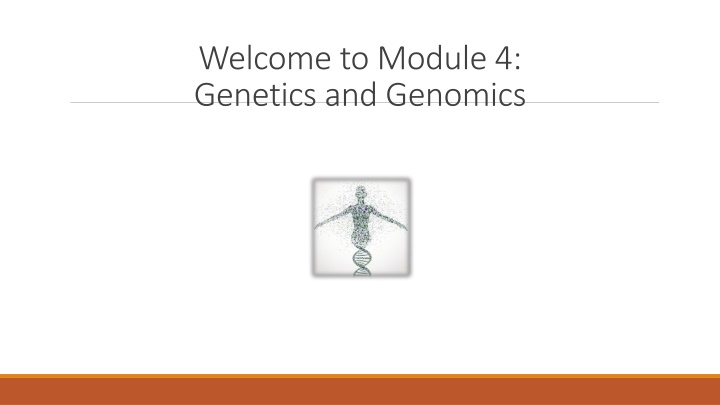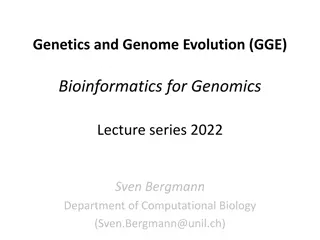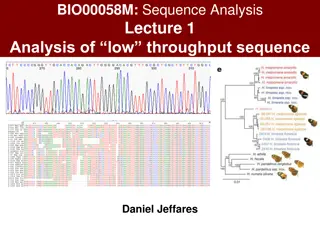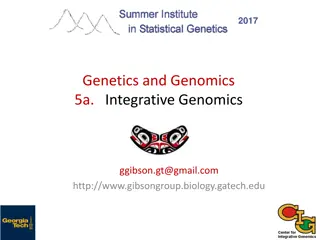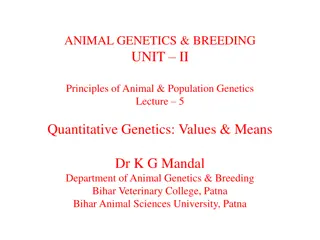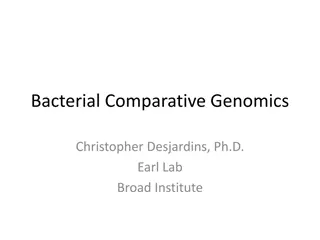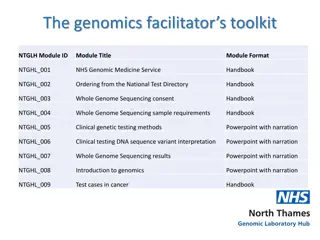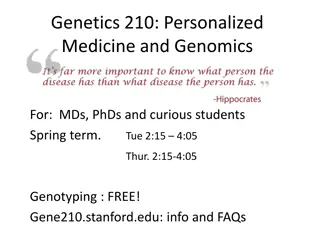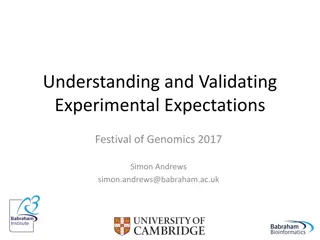Genetics and Genomics in Healthcare
Delve into the fascinating world of genetics and genomics in healthcare, pondering questions about disease outcomes, familial health patterns, and personalized treatment strategies. Discover the shift towards a more precise and tailored approach to healthcare through genetic testing, ethical considerations, and comprehensive health assessments.
Download Presentation

Please find below an Image/Link to download the presentation.
The content on the website is provided AS IS for your information and personal use only. It may not be sold, licensed, or shared on other websites without obtaining consent from the author.If you encounter any issues during the download, it is possible that the publisher has removed the file from their server.
You are allowed to download the files provided on this website for personal or commercial use, subject to the condition that they are used lawfully. All files are the property of their respective owners.
The content on the website is provided AS IS for your information and personal use only. It may not be sold, licensed, or shared on other websites without obtaining consent from the author.
E N D
Presentation Transcript
Welcome to Module 4: Genetics and Genomics
Genetics and Genomics: The Meaning Do you ever wonder . . . Why do some people afflicted with a common diseases have better outcomes from standard treatment than others with the same disease? Why are some members of the same family affected by certain chronic diseases whereas others are not? ??????
Genetics & Genomics: The Status Quo Wellness-illness continuum Level of functioning determined by position on scale Strive for optimum level of health Health promotion and rehab strategies standardized Assumptions from the medical model Susceptibility to disease Aging = chronic disease Chronic disease = debilitation/dysfunction Aging = polypharmacy Find disease -> pill -> kill it
Genetics and Genomics: A New Way of Thinking Variants of the gene versus behavior of the disease Internal cellular environment of the gene More specific treatments Prediction of disease More personalized health promotion and illness prevention strategies Plans of care Better outcomes
Genetics and Genomics: The Language Gene Genetics Genomics Genetic disorders Pharmacogenetics Pharmacogenomics Nutrigenomics
Genetics and Genomics: The Testing Current science Alzheimer s example Link to CDC website: https://www.cdc.gov/genomics/gtesting/ Genomic Tests by Level of Evidence
Genetics and Genomics: The Assessment Personal medical history Current health state Risk factors for diseases Prior illness Family medical history Disease trends Risk factors Genetic and genomic testing Prediction
Genetics and Genomics: Personal Medical History Nora Growth and Development Changes in height and weight Challenges over lifespan (congenital, physical, cognitive) Current status of health Physical Functional Illness history Acute Chronic Social determinants of health Economic Social Spiritual Nutritional Environmental Perception of personal health
Nora M. Growth and Development: Determinants of Health: Ht: 67 ; wt 175 lbs.; no recent changes in ht. or wt. Self-employed-professional personal coach with income satisfactory to meet basic needs food, clothing, living expenses, married with one son in college who lives at home part-time; Christian faith; adequate nutrition though has yo-yo dieted for over 20 years; walks 15 mins/day, on occasion twice daily, stretching exercises every morning, but basically sedentary lifestyle; member of church choir and bridge club Current Health Status: No recent problems. Chronic conditions stable; maintaining a borderline elevation of cholesterol; HGA1C remains in prediabetic range on diet alone, continues with chronic R knee pain and generalized myalgias, depression stable. Perception of Health: Illness History: Hypercholesterolemia, prediabetes, colon polyps; fibromyalgia, osteoarthritis, L knee replacement, depression I wish I was healthier! But I guess I m getting older so have to expect all these aches and pains and slowing down. I wish my thinking was clearer; but I guess that s normal too for my age. Medications: Celexa 30 mg qd; Celebrex 20 mg daily
Genetics and Genomics: Family History: Genograms and Pedigrees Nora s Genogram goes here Nancy to provide Drawing and then will need recreated.
Noras Family History Profile Family Medical History Analysis of Nora Sims (3-Generation Genogram) Disease/Condition Cancer Maternal All 3 generations 8 cases: 5 uncommon, 3 common All generations 9 cases: more prevalent in females All 3 generations 10 cases: 8 male/2 female (hypercholesterol, heart attacks, strokes, HTN) 2nd generation 2 cases: Both female: 1 senile dementia; 1 Alzheimer s Dementia All 3 generations 6 cases: All female Paternal 2nd generation 2 cases: 1 uncommon; 1 common NONE Analysis History cancer from uncommon sites All generations effected Highly prevalent in females in all generations on maternal side Highly prevalent in males; present all generations Diabetes 2nd and 3rd generations 5 cases: 3 male/2 female (hypercholesterol, CHF, heart attack, HTN) NONE Cardiovascular Disease Dementia Low risk Depression NONE Relative risk
Genetics and Genomics: Noras Profile Recommendations for Genetic Testing Should genetic testing be considered for Nora? Before making decisions regarding genetic testing, further assess of health habits of Nora and her family members (age of onset of disease, hx of obesity, lifestyle, diet preferences, exercise). Even though type II diabetes is thought to be primarily lifestyle related, given the strong trend through the maternal lineage for obesity and diabetes, should genetic testing be considered? Considering Nora's concern about her unclear thinking and her history of depression, would she be a candidate for genetic testing for Alzheimer's dementia? What do you think?
Genetics and Genomics: Nurse Competencies Nurse Competencies American Association of Colleges of Nursing (AACN) Master s Essentials for Graduate Nurse Education Essential I: Background for Practice from Sciences and Humanities American Nurses Association Essentials of Genetic and Genomic Nursing Competencies Purpose Domains Professional Responsibilities Professional Practice (http://www.nursingworld.org/search.aspx?SearchPhrase=Essentials%20of%20Genetic%20and%20Genomic%20Nursing)
Genetics and Genomics: Professional Responsibility Domain: professional responsibility Competencies Values Advocacy Professional development Informatics technology Personalized patient education
Genetics and Genomics: Professional Practice Assessment and integration Identification Referral activities Provision of education, care, and support
Genetics and Genomics: Conclusion Person-Centered Health Care Through Genetics and Genomics (Diagram Caption)
References American Association of Colleges of Nursing (AACN). (2011). The essentials of graduate nursing education. AACN: Washington, DC. Bancroft, E. K. (2013). How advances in genomics are changing patient care. Nursing Clinics of North America, 48(4), 557 569. doi:10.1016/j.cnur.2013.08.002 Carroll, J. C., Campbell-Scherer, D., Permaul, J. A., Myers, J., Nance, D., Meany, C., Moerneddin, R., & Grunfeld, F. (2017) Assessing family history of chronic disease in primary care: Prevalence, documentation, and appropriate screenings. Canadian Family Physician, 63(1), 58 67. Umberger, R., Holston, E. C., Huston, S. P., & Pierce, M. (2013). Nursing genomics: Practice implications every nurse should know. Nursing Clinics of North America, 48(4), 499 522. doi:10.1016/j.cnur.2013.08.006
References Mukherjee, S. (2015). Soon we'll cure diseases with a cell, not a pill [TED Talks]. Retrieved from https://www.ted.com/talks/siddhartha_mukherjee_soon_we_ll_cure_diseases_with_a_cell_not_a_pill American Nuses Association. (2008). Essentials of genetic and genomic nursing: Competencies, curricular guidelines, and outcome indicators (2nd ed.). Silver Spring, MD. Lea, D.H. (2009). Basic genetics and genomics: A primer for nurses. The Online Journal of Issues in Nursing. Retrieved from http://www.nursingworld.org/MainMenuCategories/ANAMarketplace/ANAPeriodicals/OJ
